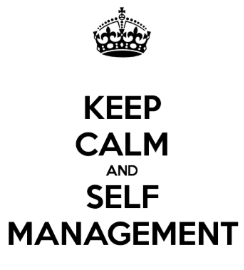Self-management skills

Self-management skills can be broken down into two distinct types:
- organisation skills which are effectively time management, goal setting etc.
and
- affective skills, which concern the emotions and state of mind.
Both are important, both can be modelled and both are to a large extent learnable.
Possessing and practising good self-management skills can make a considerable difference to your academic performance by alleviating stress and making you feel that you have considerable control over your own learning.
Organisation skills
 Organisation skills are perhaps the most obvious to deal with when considering self-management. In many ways you can learn from the good (or bad!) examples set by others. Your teacher cannot really expect you to complete assignments on time if he or she does not them mark them and return them in a timely manner. Similarly, if your teacher or some of the other students habitually turn up late for your classes it is not a good example. Something that you will acutely be aware of is the total demands on you from all subjects as a Diploma student. All schools should provide a coursework calendar of all the required major deadlines over the two year period and you should be aware of this so that you can plan your workload to meet these required deadlines. It is good if each student has a personal tutor who can help you plan how to manage your time throughout the course. Ideally whenever your teacher sets an assignment that is not on the coursework calendar they should discuss it with all the members of the class and together agree the deadline. You should also know that you are expected to go over the concepts and knowledge covered in the previous class before attending your next chemistry class so that you can expect a quick summary or quiz at the beginning of the next class. However your teacher should always give you reasonable notice if you are getting a test that will count towards your internal grades etc., rather than just springing it on you. The importance of deadlines should have been explained to you at the outset of the Diploma course and you should be very clear about what is expected of you. Teachers are within their rights to refuse to accept any work that is handed in late without a genuine good reason. As the course proceeds you will gradually be expected to take more and more responsibility for your own learning, as once you move on to higher education this will very much be the case. The quizzes and slide galleries on this site can be a real asset as they can help you ascertain for yourself where any weaknesses lie.
Organisation skills are perhaps the most obvious to deal with when considering self-management. In many ways you can learn from the good (or bad!) examples set by others. Your teacher cannot really expect you to complete assignments on time if he or she does not them mark them and return them in a timely manner. Similarly, if your teacher or some of the other students habitually turn up late for your classes it is not a good example. Something that you will acutely be aware of is the total demands on you from all subjects as a Diploma student. All schools should provide a coursework calendar of all the required major deadlines over the two year period and you should be aware of this so that you can plan your workload to meet these required deadlines. It is good if each student has a personal tutor who can help you plan how to manage your time throughout the course. Ideally whenever your teacher sets an assignment that is not on the coursework calendar they should discuss it with all the members of the class and together agree the deadline. You should also know that you are expected to go over the concepts and knowledge covered in the previous class before attending your next chemistry class so that you can expect a quick summary or quiz at the beginning of the next class. However your teacher should always give you reasonable notice if you are getting a test that will count towards your internal grades etc., rather than just springing it on you. The importance of deadlines should have been explained to you at the outset of the Diploma course and you should be very clear about what is expected of you. Teachers are within their rights to refuse to accept any work that is handed in late without a genuine good reason. As the course proceeds you will gradually be expected to take more and more responsibility for your own learning, as once you move on to higher education this will very much be the case. The quizzes and slide galleries on this site can be a real asset as they can help you ascertain for yourself where any weaknesses lie.
Affective skills

However good you are at organising your time you still need the motivation to actually complete assignments in the allotted period. Affective skills address this and include resilience and self-motivation. External factors such as the death of a close relative or a family breakdown can obviously affect your ability to concentrate but in more normal circumstances you can develop strategies to improve your affective skills.
Resilience
Resilience has close links to the learner profile attribute of ‘risk taker’. For you to be successful both at school and later in life you need to be able to learn from your mistakes. That is you should not be afraid to fail. At times learn to move out of your comfort zone and then reflect and learn from both your positive and negative experiences when you do so. A resilient student will bounce back from ‘failure’. This is one of the attributes that US university teacher recommendations place great emphasis on – “reaction to set-backs”.
Self-motivation
Self-motivation is often linked to perseverance. You need to want to succeed and be willing to put in the necessary effort to ensure this. For some students the motivation is to be the best in the class. Possibly a much better approach is to develop your own self-esteem and self-worth (not every student can be the best in the class!). It is much more satisfying to compete against yourself and stretch your own horizons than it is to feel superior to everyone else. Show initiative and look at possible alternative solutions rather than just play safe and always get everything right.
Mindfulness
Mindfulness is somewhat of a buzz word but it is linked to the ability to concentrate. Modern media tends to encourage students to flit from topic to topic in short bursts – ‘Twitter’ has a lot to answer for! It is an important skill to be able to summarise your thoughts as concisely as possible. However the ability to ‘multitask’ is sometimes seen as more important than the ability to concentrate on the task in hand. You may well benefit from relaxation techniques that can help you to keep your attention focused and avoid distractions.

 IB Docs (2) Team
IB Docs (2) Team